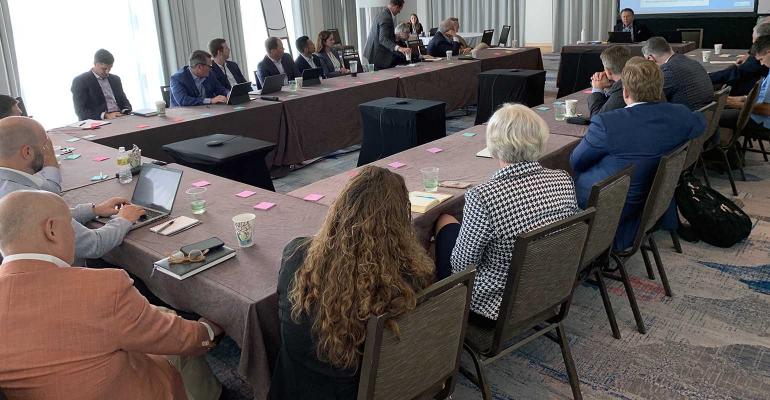As the top and most progressive retirement plan advisor aggregators got together at the 5th Annual RPA Aggregator Roundtable & Think Tank embedded within the WealthManagement EDGE Conference, never have the opportunities been so compelling and the challenges been so daunting.
Since the inaugural RPA Aggregator Roundtable & Think Tank was held in March 2018, the aggregators have gone from $1 trillion in defined contribution assets to $2.6 trillion, accounting for half of the advisor market and almost 25 million participants. They are our greatest hope to leverage technology and data to help many if not all participants navigate their financial journey from saving to retirement by creating a new business model for the 97% of participants not served by or of interest to wealth managers.
Getting there will be hard and likely of the 15 RPA aggregators still in stage 2 of the consolidation curve, only about half will make it out of stage 3, where large firms start gobbling up each other— similar to where record keepers now reside.
Each of the compelling opportunities present equally difficult challenges:
- COVID-19 provided opportunities to service clients remotely and access participants more effectively, yet face-to-face meetings are more difficult and still of value, as is managing a remote workforce, especially integrating new employees from acquisitions.
- The war for talent and managing a remote workforce have made benefits more important to plan sponsors but most RPAs are still stuck in the Triple Fs paradigm.
- Plan sponsors want their RPA, the only advisor that most workers will ever meet, to help workers with all benefits suggesting the right mix, but most RPAs are not equipped to meet that challenge, even the wealthy ones.
- The technology and practices to work with individuals were front and center at the WealthManagement EDGE, but translating them to the DC industry will be hard as data is not readily available, fraught with privacy concerns and the 1990s record keeper technology is extremely limiting.
- New laws and regulations seem to favor increased plans and savings at work as well as opening the door for retirement income, but litigation is out of control with the wildfire spreading to RPAs as they expand services and become more attractive targets.
- As the Fab Five record keepers solidify their positions preparing to enter the 4th and final stage of the consolidation curve five years behind the airline industry, the fight for who works with participants is just beginning, threatening decades of partnerships and cooperation with advisors.
- RPA M&A activity has helped many firms achieve scale but execution and integration while building a scalable wealth stack will quickly separate the winners and wannabes.
Internal industry focus can sometimes blind us to the bigger picture of a possible recession as inflation rises plus the war in the Ukraine, which could bleed into the rest of Europe as well as China’s intentions about Taiwan.
So what are the elite aggregators focused on?
- Jaron Carmichael, Mercer Advisors director of Retirement Group, said that his firm is shifting their focus from the board to the breakroom, leveraging relationships with wealth management clients that own or manage businesses using the DC plan as a loss leader.
- While Lockton threw in the towel and sold their retirement division to Creative Planning, Gallagher’s National Practice Leader John Jurik said his firm is committed to wealth management as a way to further serve businesses and their leaders.
- UBS’s Dan Renz, director of Retirement Engagement, part of the new regime try to bring wealth and retirement together, indicated that few if any wealth clients also use UBS to manage their retirement plan, an opportunity they are sure to look at especially with the $1.4 billion acquisition of WealthFront.
- Both Carmichael and JW Waggoner, national executive benefits specialist at VisionPoint, see opportunities with PEPs for smaller plans while Lew Minsky, DCIIA’s CEO and executive director, pointed out that the institutional market also values PEPs as a way to mitigate liability and stave off litigation.
- While technology can help RPAs with their practice and serve more participants, Wise Rhino Group Managing Director Peter Campagna reminded us that technology will not solve all issues. He also noted that the barometer of change is the RPA M&A market, which is still red hot.
- Wise Rhino Group CEO Dick Darian, who heralded RPA M&A, noted that RPAs have an advantage over RIAs because of their participant base, but must look beyond record keeper data.
- With the DOL fiduciary rule enforcement right around the corner, Jim O’Shaughnessy, president of Retirement and Wealth at Sheridan Road, a division of HUB International, noted that RIAs that depend on IRA rollovers will be challenged. Employers like one firm managing all benefits, stated O’Shaughnessy, but the challenge is morphing purist RPAs to work with participants, which is a business requirement, according to Darian.
- Brad Arends CEO at Intellicents, questioned whether the DOL fiduciary rule could also affect financial planning as more RPAs offer it perhaps at a lower cost.
- O’Shaughnessy cautioned the groups not to position wealth management services as a means to subsidize plan services—there are potential legal issues as well as diminishing plan services.
- And finally, Rick Shoff, managing director at CAPTRUST, stressed that it will ultimately all come down to execution and scale. They are lots of ideas, no silver bullets or secrets, and the firms that triumph will have been better at actually executing at scale fueled by capital.
Still to come: how RPA aggregators can cooperate with each other especially around data, technology and branding with plan sponsors as well as working with and perhaps forging a new partnerships with record keepers and DCIOs. What can they glean and incorporate from the wealth management industry who can either be allies or competitors?
Fred Barstein is founder and CEO of TRAU, TPSU and 401kTV.



